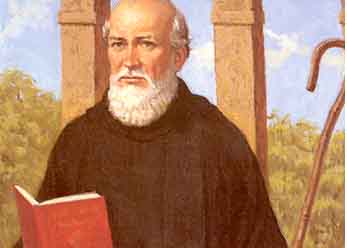And what does the Spirit say? Come and listen to me... Rule of Benedict
When Benedictine Oblate Rhea Cottingham, Rock Island, Ill., agreed to teach a class on contemplative prayer at a local college, she decided to focus on Lectio Divina, the meditative reading of scripture that requires deep listening, focus and waiting.
Lectio had helped Rhea immensely in her own spiritual journey; it had promoted, she says, an ongoing and "very personal conversation with Christ." Now she wanted to share it with others.
Rhea had learned Lectio, or sacred reading, as a Benedictine Oblate of St. Mary Monastery*. The Benedictine Sisters themselves practice it every day, as counseled in St. Benedict's Holy Rule. Indeed, as Sister Mary Margaret Funk, OSB says, Lectio is a Benedictine "way of life ... (it's) what we do all day long."
Lectio: Key to contemplative awareness of God
So, what is Lectio Divina ... and how do you do it?
Sister Mary Margaret says Lectio is "a way of praying using the revelatory texts of scripture, nature or experience." That is, Lectio is not only useful when reading the Bible, but grows into a way of praying while walking, listening to music, viewing artwork, and sitting in chapel. In other words, the listening, focus and waiting can be done any time, in any situation.
Lectio is, as St. Benedict says, "listening with the ear of the heart." It is, Sister Mary Margaret adds, "reading God."
While the practice itself is not hard – it involves multiple encounters with a short scriptural passage in order to let God speak – it does require discipline.
"The practice of Lectio requires that we pause in silence and repeat the reading of the same scripture at least three times," Rhea says. "Each time we read the passage, we approach it with a different perspective. Each time we read it we may hear something new."
Rhea says Lectio helps us slow our pace with the scriptures.
"People are often very drawn toward Lectio when they learn about it," she says. "We might find resolution or insight into problems we are having. I myself have had a word or phrase step forward in scripture that becomes the very insight I need to deal with a struggle. The students were very receptive to it."
How to do it
Lectio is the practice of reading – listening with the ear of the heart – to a scriptural passage without preconceived thought or intellectual study. It is not Bible study; nor is it an opportunity to share or discuss. It is an opportunity to quiet oneself and be receptive to God speaking through the Holy Spirit.
Here's how to practice Lectio:
Quiet yourself. You can begin with a simple word prayer, or breathing exercises. Open your Bible and read 2 or 3 lines slowly. In silence, let the words simply rest in you.
Read the text again. This time, interact with it. Ponder it. Speak with God about it. Is there a word or phrase that speaks to you? What is it saying to you?
Read the text again. This time, simply rest in the words. Thank God for being with you both in words and in silence.
Finally, Michael Casey, OSB suggests in The Road to Eternal Life that if we continue to ponder the reading as we go through the day, it will provide "a place to which we can return momentarily to center ourselves and, perhaps, find peace in the midst of busyness."
Oblate Director Sister Ruth Ksycki, OSB says, "Oblates often say that group Lectio is their favorite part of our meetings. The sharing is enriching and challenging. It also helps them in their personal practice of Lectio."
It helps them find peace, and, with daily practice, deeper intimacy with God.
* Benedictine Oblates are lay people – women and men, married and single, Christian but not necessarily Catholic – who affiliate themselves with a particular Benedictine community in order to follow the Rule of St. Benedict in their lives outside the monastery. To learn about the Oblate program at St. Mary Monastery, contact us at oblates@smmsisters.org.
